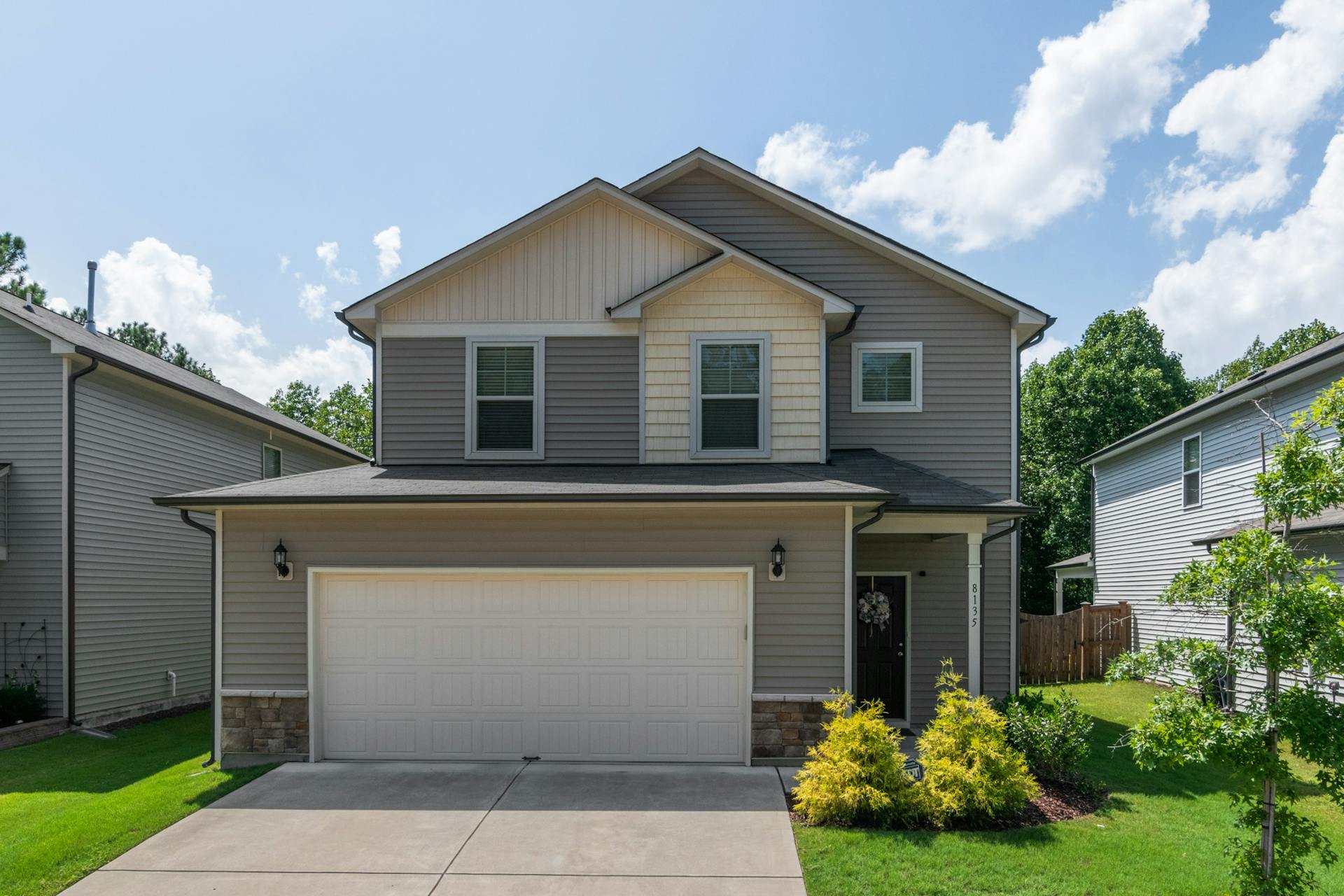
A reverse mortgage can be a game-changer for homeowners who are 62 or older and have paid off their mortgage.
You can use the funds from a reverse mortgage to pay off any outstanding mortgage balance.
The amount you can borrow depends on the value of your home, your age, and the interest rate.
Typically, you can borrow up to 55% to 65% of your home's value.
You might enjoy: Pay down Mortgage with Heloc
What Is a Reverse Mortgage?
A reverse mortgage is a type of loan that allows homeowners to borrow money using the equity in their home as collateral.
To be eligible for a reverse mortgage, you typically need to be at least 62 years old and own your home outright or have a low balance on your mortgage.
You can use the funds from a reverse mortgage for any purpose, such as paying off existing debts, covering living expenses, or funding home repairs.
The amount you can borrow depends on the value of your home, your age, and current interest rates.
Repayment works by the loan becoming due when you pass away, sell your home, or move out of it permanently.
Eligibility and Requirements

To be eligible for a reverse mortgage, you must own a home that's your principal residence, such as a house, condominium, townhouse, or manufactured home built on or after June 15, 1976. However, if you live in a cooperative housing, you're not eligible for a reverse mortgage.
You must also meet the age requirement, which is 62 years old for most types of reverse mortgages, although some private-label reverse mortgages may go down to age 55. You must also be able to keep up with ongoing property expenses, such as taxes, insurance, and home maintenance.
Here are the key requirements for a Home Equity Conversion Mortgage (HECM), which is the most common type of reverse mortgage:
- You must be at least 62 years of age.
- The home must be your principal residence.
- You must own your home outright or maintain a low mortgage balance.
- You must not be delinquent on any federal debt.
- Your home must meet specific quality standards.
- You must get counseling from a HUD-approved reverse mortgage counseling agency.
Who Is Right for?
If you're considering a reverse mortgage, it's essential to understand who might be a good fit. Homeowners who want to remain in their current homes might find a reverse mortgage suitable.
A reverse mortgage can be a solution for those who need money for everyday living expenses or other important purposes. This can be a lifesaver for people who are struggling to make ends meet.

You'll also want to consider your financial situation. If you have few (or no) other assets to draw on, such as retirement accounts, a reverse mortgage might be a viable option. This is especially true if you're living on a fixed income.
Some people might not qualify for other types of loans due to income or credit requirements. If this is the case, a reverse mortgage could be worth exploring.
Requirements for Obtaining
To be eligible for a reverse mortgage, you must meet certain requirements. You must be at least 62 years old, and all borrowers listed on title must meet this age qualification.
The government has a number of rules regarding eligibility for reverse mortgages and the borrower's responsibilities once they have obtained one. You must own your home outright or maintain a low mortgage balance.
The most common type of reverse mortgage is the Home Equity Conversion Mortgage (HECM), which is regulated by the U.S. Department of Housing and Urban Development and insured by the Federal Housing Administration (FHA). To qualify for an HECM, you must meet specific requirements, including:
- You must be at least 62 years of age.
- The home must be your principal residence.
- You must own your home outright or maintain a low mortgage balance.
- You must not be delinquent on any federal debt.
- You must be able to keep up with ongoing property expenses.
- Your home must meet specific quality standards.
- You must get counseling from a HUD-approved reverse mortgage counseling agency.
An appraisal is required for every reverse mortgage, which determines the value of your home and checks for any issues that could affect the loan's security.
Understanding Fees and Costs

You'll face an assortment of fees when taking out a reverse mortgage, including origination fees, upfront mortgage insurance premiums, and other closing costs.
Origination fees are charged by lenders to process the loan, ranging from $2,500 to $6,000, depending on the home's value.
The upfront mortgage insurance premium is 2% of the home's appraised value, so for every $100,000 in value, you'll pay $2,000.
On a $300,000 house, the upfront mortgage insurance premium would be $6,000.
You'll also have to pay annual insurance premiums equal to 0.5% of the outstanding loan balance.
Mortgage insurance premiums are apart from homeowners insurance, which you'll still need to pay each year.
Origination fees are calculated as 2% of the first $200,000 of the home's value and 1% of the remaining value.
The FHA sets a floor of $2,500 and a ceiling of $6,000 for origination fees.
Here's a breakdown of the fees you can expect with an HECM reverse mortgage:
You'll also need to consider ongoing costs like homeowners insurance premiums and property taxes, which can be rolled into the loan or paid separately.
Borrowing and Repayment

You can borrow from a reverse mortgage without making monthly payments, but the balance is due when you move out, fail to pay taxes or insurance, or die. The lender will sell your home to recoup the loan amount, and any remaining equity goes to you or your heirs.
The loan balance increases over time due to interest rates, which depend on the lender, loan type, and whether it's an adjustable or fixed-rate mortgage. You can choose to receive funds in various ways, including a lump sum, monthly payments, or a line of credit.
Here are some ways to receive funds from a reverse mortgage:
- Cash Lump Sum at Closing: Receive all the money at once.
- Line of Credit: Draw money as you need it.
- Term Payment: Receive a set amount of money for a specific period.
- Tenure Payment: Receive guaranteed payments for as long as you live in your home.
You can customize these options to fit your needs by combining them. For example, you might choose a lump sum at closing to improve your property, set up a monthly payment for a specific period, and leave an additional amount available in a line of credit.
How it Works

A reverse mortgage is a loan based on the equity you have in your home. The lender makes payments to the homeowner, not the other way around.
The home serves as collateral for the loan, and the lender can sell the home to recoup the loan's principal and interest when the homeowner moves out or dies. Any sale proceeds beyond what the lender is owed go to the homeowner or their estate.
The loan amount won't exceed the home's value, thanks to federal rules and mortgage insurance. This means you won't be held responsible for paying the lender the difference if the home's value drops.
You can choose to receive your home equity in several ways, including a lump-sum disbursement, fixed monthly payments, a line of credit, or a combination of these options.
Here are the different ways you can receive funds from a reverse mortgage:
- Cash Lump Sum at Closing: Receive all the money at once.
- Line of Credit: Draw money as you need it.
- Term Payment: Receive a set amount of money for a specific period.
- Tenure Payment: Receive guaranteed payments for as long as you live in your home.
You can customize these options to fit your needs by combining them, just like a savvy borrower planning for future needs might do.
Repayment Requirements

You don't have to make monthly payments to the reverse mortgage lender because the balance isn't due until you move out, fail to pay taxes or insurance, forgo home maintenance, or pass away.
The lender will require repayment if you sell the home, reside outside the home for more than a year, pass away, fail to maintain the property, or stop paying homeowners insurance premiums or property taxes.
You or your heirs can repay the reverse mortgage by selling the home, and the proceeds from the sale will first cover repayment of the entire reverse mortgage balance. Any remaining equity will be yours or your heirs' to keep.
If you'd rather not sell your home to repay the loan, you can make payments on the mortgage at any time during the loan term. However, interest rates will add to the cost of your loan, and the interest rate you receive will depend on various factors, such as the lender you choose and the type of loan you get.
See what others are reading: Does Mortgage Interest Accrue Daily

Here are the scenarios that trigger repayment:
- Selling the home
- Residing outside the home for more than a year
- Passing away
- Failing to maintain the property
- Stopping payment of homeowners insurance premiums or property taxes
If an heir inherits the property with a balance that exceeds the current market value, they can choose to pay the loan in full at 95% of the current market value, even when that is less than the amount owed.
Suggestion: Retail Money Market Funds
Financial Considerations
Lenders conduct financial assessments to ensure you have enough money for ongoing costs like property taxes and homeowners insurance. This ensures you can afford to keep your home.
A reverse mortgage can be a great option if you plan to stay in your home for the rest of your life and want to use your home equity to improve your financial situation.
A unique perspective: Ditech Financial
Are Proceeds Taxable?
When considering a reverse mortgage, it's essential to understand the tax implications of the proceeds. Reverse mortgage proceeds are not taxable, as the Internal Revenue Service (IRS) considers the money to be a loan advance.
This means you won't have to worry about paying taxes on the funds you receive from your reverse mortgage.
Is a Good Idea?

A reverse mortgage can be a great option if you plan to stay in your home for the rest of your life and want to use your home equity to improve your financial situation.
It's essential to assess your future plans and financial needs before deciding if a reverse mortgage is right for you. If you're considering moving later in retirement, it's worth exploring other options.
A reverse mortgage can provide extra funds to help you live more comfortably during retirement. This can be a significant advantage for those who want to maintain their lifestyle without depleting their savings.
However, if you're not planning to stay in your home, a reverse mortgage might not be the best choice.
A unique perspective: Simplii Financial
Using a Reverse Mortgage
A reverse mortgage can be a versatile retirement funding tool. You can use it to pay off your forward mortgage, freeing up more money in your budget.
There are 25 ways to use a HECM, but let's focus on the basics. A reverse mortgage is a loan available to people over 62 years of age that enables a borrower to convert part of the equity in their home into cash.
A unique perspective: Are Mortgage Brokers Worth It

You can access funds from a reverse mortgage through a line of credit. This is a standby line of credit that you only use when you need it. Borrowers can access funds by submitting a request, and it's a good idea to think about how you'll use the money before tapping into it.
You can also tap into your home equity in retirement by taking out a reverse mortgage. This can be a good option if you have a lot of equity in your home and need some extra cash.
Suggestion: Do I Need a Mortgage Advisor
Loan Options and Alternatives
If you're under 62, a home equity loan or HELOC might be a better option than a reverse mortgage, as they offer access to 80-85% of your home's value with lower closing costs and fees. You'll still need to make monthly payments, but it's a more traditional loan setup.
For those over 62, there are alternative options to consider, such as downsizing to a less expensive home, refinancing your current mortgage with a cash-out option, or exploring a sale-leaseback agreement. These options can provide financial relief and flexibility.
Here are some key differences between a reverse mortgage and other loan types:
By understanding these loan options and alternatives, you can make informed decisions about your financial future and explore options that work best for you.
Types of Reverse Mortgages
There are several types of reverse mortgages, each with its own unique features and benefits. The most common type is the Home Equity Conversion Mortgage (HECM), which is insured by the Federal Housing Administration (FHA) and has a funding limit of $1,149,825.
A HECM allows homeowners to borrow against their home's equity and use the funds for any purpose, such as paying off debts, funding home improvements, or supplementing their retirement income. Homeowners must be at least 62 years old and meet certain eligibility requirements to qualify for a HECM.
Jumbo reverse mortgages, also known as proprietary reverse mortgages, are another option for homeowners with higher-valued properties. These loans have no funding limit, but often come with higher fees.
Single-purpose reverse mortgages are offered by some state and local government offices and nonprofit organizations, and are intended for a specific purpose, such as healthcare expenses or property taxes.
Here are the main types of reverse mortgages:
- Home Equity Conversion Mortgage (HECM): Insured by the FHA and has a funding limit of $1,149,825.
- Single-purpose reverse mortgage: Intended for a specific purpose, such as healthcare expenses or property taxes.
- Proprietary reverse mortgage: A private loan with no funding limit, but often comes with higher fees.
Loan Alternatives
If you're considering a reverse mortgage but are under 62, you may want to look into a home equity loan or a HELOC. These financial products allow you to access 80%-85% of your home's value with lower closing costs and fees compared to a reverse mortgage.
You'll need to make monthly payments with a home equity loan or HELOC, but this can be a more affordable option. For example, you can use the proceeds from a home equity loan to pay off debt or make home repairs.
If you're over 62, there are other alternatives to consider. Downsizing to a less expensive home can provide some extra cash to pay off debt or buy a new home. By selling your current home and using the proceeds to pay cash for another home, you can avoid taking on more debt.
A cash-out refinance of your current mortgage can also be an option. This type of refinance can lower your monthly payments and create some extra room in your budget. The FHA even offers a cash-out refinance program.
If this caught your attention, see: Equity Loan to Pay off Credit Cards
You may also want to consider a sale-leaseback agreement. This is an arrangement where you sell your house to a new owner and then rent the home from them using the proceeds from the sale. Many people use this option to sell to their children and then rent the home from them.
You might like: How Much Can You Sell a Mortgage Note for
Traditional Loans
With a traditional loan, you make monthly payments to reduce the amount you owe, increasing your property equity over time.
You can choose a loan term that suits your needs, whether it's a short-term loan or a long-term one.
As you pay off the loan, you'll see your property equity grow, and you may be able to use that equity for other financial goals.
Traditional loans often come with fixed interest rates, which means your monthly payments will be the same every month.
You'll also have the option to make extra payments or pay off the loan early, which can save you money on interest over time.
By making regular payments, you can own your property outright and enjoy the benefits of homeownership without any debt.
A unique perspective: Mortgage Interest Rate
Understanding the Loan Amount
The loan amount you can receive from a reverse mortgage is determined by several factors, including your age, the value of your home, and the current interest rate.
For a HECM loan, the amount you can borrow is based on the youngest borrower's age, the loan's interest rate, and the lesser of your home's appraised value or the FHA's maximum claim amount, which is $1,149,825 in 2024.
The older you are, the higher the loan proceeds you can receive, which is why the age of the youngest borrower is a significant factor in determining the loan amount.
As mentioned in the guidelines, the loan amount will be based on the younger spouse's age if the borrower is married, even if the younger spouse is not a borrower.
The size of the loan will also depend on the interest rate, with lower rates allowing you to borrow more and higher rates resulting in lower loan amounts.
Explore further: Will Mortgage Rates Drop after Election

Your home's appraised value also plays a crucial role in determining the loan amount, with higher values resulting in higher loan amounts.
Here are the key factors that determine the loan amount:
- Your age (based on the age of the youngest borrower)
- The home's value
- The current interest rate
- The type of reverse mortgage
- Your financial ability to pay property taxes and homeowner's insurance
Payment and Credit Considerations
You can receive funds from a reverse mortgage in several ways, including a cash lump sum at closing, a line of credit, term payment, or tenure payment.
A line of credit is a popular option, allowing you to draw money as you need it. You can also customize your payment options by combining them, just like a savvy borrower in California who chose to receive $100,000 at closing and set up a monthly payment of $1,000 for four years.
Unlike traditional loans, your credit score isn't a major factor for approval, but your credit history is still important. Lenders will examine your ability to pay ongoing property taxes, homeowners insurance, and other home-related expenses.
You can still qualify for a reverse mortgage with a low credit score, but you may need to set aside money for future property taxes and insurance payments if you've been late on them in the last two years.
Here are some common reverse mortgage payment options:
Frequently Asked Questions
What is the 60% rule in reverse mortgage?
The 60% rule in reverse mortgage limits HECM borrowers to taking the greater of 60% of their total available equity or 110% of their mandatory obligations in the first payout. This rule ensures borrowers don't over-borrow against their home's value.
What is the 95% rule on a reverse mortgage?
To qualify for a reverse mortgage payoff, heirs must sell the home for at least 95% of its appraised value, with the remaining balance covered by mortgage insurance. This ensures a smooth payoff process for heirs after the borrower's passing.
What is the 5 and 5 rule for reverse mortgage?
The 5-5 rule for reverse mortgage requires that the new loan's principal be at least five times the closing costs and the loan proceeds exceed 5% of the refinanced amount. This rule helps ensure you receive sufficient funds from the new loan.
Featured Images: pexels.com


